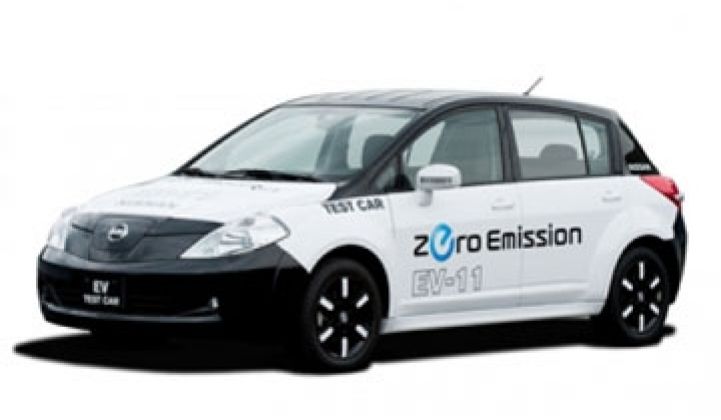A Nissan executive has said the automaker will consider building cheaper hybrid cars as an interim measure, while its full electric vehicle rollout takes shape.
Nissan's Executive Vice President Mitsuhiko Yamashita told Reuters that, while the automaker had no hard plans for small- or mid-size hybrids, it may be necessary to build them because full electric vehicles are "going to take a while."
Nissan has made electric vehicles its focus so far, though it has said it will make a few hybrid versions of luxury vehicles. Its commercial electric car, on the other hand, is receiving a lot of publicity as the world's first mass-produced EV, set for 2010 at a price of $20,000 to $30,000 (see Green Light post and Under the Hood With Nissan's Electric Car).
That EV is expected to go about 100 miles on a full charge, a range Nissan insists satisfies the vast majority of people's driving needs. It intends a global rollout of multiple EVs in 2012.
But some automakers are leery of trying to sell a car that takes hours of being plugged in to do what an old-fashioned combustion engine vehicle can do in minutes at the gas station. The Renault-Nissan Alliance is working on deals with governments around the world to build fast-charging networks in hopes of solving that problem, as are others (see Singapore Joins Renault-Nissan EV Partnership).
Automakers are increasingly splitting the difference when it comes to the hybrid/EV debate. Toyota, which will soon release a plug-in version of its top-selling Prius hybrid in 2012 (see Green Light post), also intends to build a compact, shorter-ranged EV by 2012, for example (see Toyota to Build All-Electric Car by 2012).
Ford also plans to be building plug-in hybrid vehicles by 2012, but will precede those with an all-electric commercial van in 2010 and an all-electric passenger car in 2011.
Meanwhile, the Hyundai-Kia Automotive Group will invest £2 billion ($3.3 billion) in new hybrids along with its long-standing work on fuel cell vehicles, in hopes of becoming a top-four green automaker by 2012, Autocar reported Monday.
Fuel cells have lost favor in comparison to plug-in hybrids and electric vehicles, although Congress may give a reprieve to the U.S. fuel cell industry if it reauthorizes federal research funding that Energy Secretary Steven Chu had sought to strip from the department's budget (see Congress Looks to Restore Vehicle Fuel Cell Research Funding).
Hyundai has fuel cell prototypes in testing, and the Hyundai Kia group is launching its Avante and Forte hybrid sedans this summer, though they're powered with liquid petroleum gas rather than gasoline. Hyundai plans a gasoline-electric hybrid next year, the New York Times reports.
But for a full electric Kia, right now you'd have to go to Leo Motors, which will sell you a conversion kit for a little bit more than the car will cost – probably not a viable mass manufacturing option (see Green Light post).
Nissan, by the way, is also experimenting with newfangled ways to charge cars, such as inductive charging plates for cars on the go (see Green Light post). Such a system might be able to piggyback on the magnetic sensing loops buried under the pavement that tell streetlights when someone's waiting at a red light, but making them charge cars entails cost and safety concerns.



